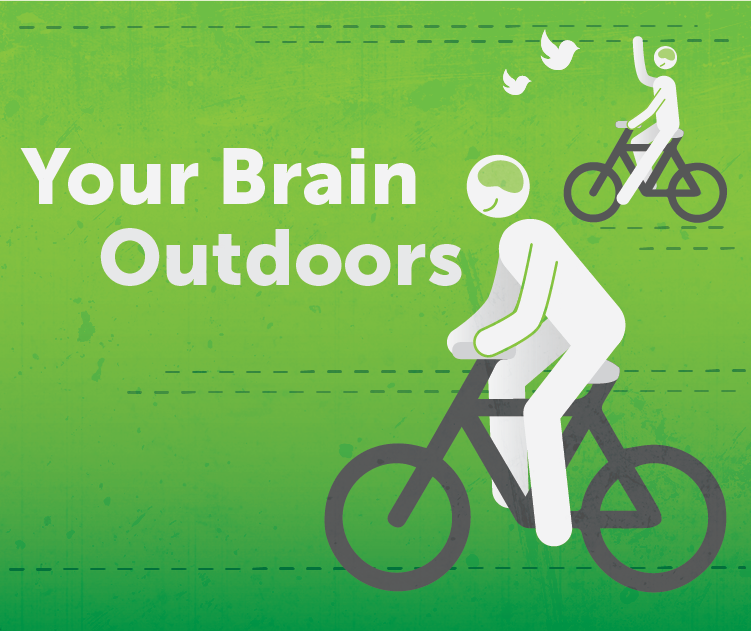It’s summertime — even here in San Francisco.
I look around and I see my neighbors putting down their devices and heading into the great outdoors. And, that should not be just a seasonal joy; it’s actually very good for your brain any time of the year.

We weren’t meant to spend as much time inside – in a controlled environment – as we do. The brain thrives when it encounters new things and challenges.
As just one example, studies have shown that walking on an uneven surface – such as cobblestones – and making the constant requisite physical adjustments is better for your brain than the monotony of paved surfaces.
Your Brain at the Beach
Walking on the beach, for example, is not just great summer fun. It enlivens your brain as you feel the sand squish between your toes and you get back in touch with the sensations from your feet that activate and inform the somatosensory system your brain employs – in all sorts of fine detail – to maintain your balance and gait.
And, on that walk, there are so many things to see: boats on the horizon, gulls flying overhead, children running to and fro, dogs chasing balls… Even if you are looking down, there’s a lot to scan and search for: rocks, crabs, seashells, beach glass… And, there’s a lot to smell and hear. A beach walk really engages your senses in a way that is both challenging and rewarding.
But maybe you don’t live by the beach, or you don’t like the beach. A walk in the woods can be just as engaging and good for you.
The woods are full of delights. It’s full of interesting and wonderful things.
Your Brain in the Woods
We really are designed to be masters of our environment, to fully appreciate the details of what’s out there. Historically, humans knew all about the details of the world they lived in. We’ve lost that… and it’s not good for the brain.
One of the things I love to do in the woods is to go bird-watching. It’s exciting for your brain to engage with avian life. Birding challenges multiple senses and types of cognition. You hear the bird call, and can use that to help locate the bird, along with your visual skills. And, it’s “vision in motion,” which is important to exercise, so you can maintain your ability to navigate the world. If you have the talent to mimic a call, you may succeed in calling the bird to you. Once you actually find the bird (or maybe just based on its call), you engage your memory and decision-making to identify the bird type and often gender. As you raise your binoculars, you exercise your fine motor control, and as you race across the uneven path to get a better view, you exercise your gross motor skills. Bird-watching can be a wonderful whole brain workout.
I should point out that all of this is likely done under conditions of not insignificant excitement. You’re really interested in what you are doing. It’s an enlivening experience. It’s full of surprises and delights.
Brain Chemical Reactions
Such activities cause a beneficial chemical explosion in the brain. Those challenges spark the production of acetylcholine in the brain as you concentrate on all that is happening around you. The walk is apt to be laden with surprises, sparking the production of the norepinephrine, as you encounter novelty. And, even if you live on the water or by the woods, there is something inherently rewarding about such walks. When you feel rewarded, your brain produces dopamine. All of these brain chemicals help with learning, memory, and mood. They help keep the brain engaged and healthy.
Little surprises are brain food. And, the forest or the beach are filled with little surprises — if you just look for them.
We’ve looked at this in studies to see what happens if we exercise this machinery regularly, so that these chemicals get released often, and what we see is that it’s very good for sustaining the health of the brain.
Your Brain in the Park (with others)
Maybe, like me, you spend a lot of your time in a city. That’s where I love to go to the park. And, you know what makes a walk in the park even better? Going with someone. Why not a child or grandchild or a group of people you enjoy? You need to engage and continue to nurture your social cognition. That’s really important to keeping your brain healthy and alive.
I love it when my walk companion is one of my grandchildren. I love to play catch. You contribute to the evolution of the hand-eye coordination and development of the control of the actions of the child. But, guess what? It also contributes to the exercise of the control of actions by Grandpa. That’s just as valuable. So, get out there and play catch.
We need to maintain our control of our actions in their natural elaborate forms. What tends to happen as we get older is our routine gets set and our actions get constrained and stereotyped. We tend to lose our abilities to deal with significant variations. Any activity that drives you to move and solve problems “every which way” is good for you.
You’ve just read what I hope was a fairly interesting piece on the brain outdoors — probably using your computer, tablet, or phone. I’d like you to set that device aside, now, and please go enjoy the outdoors.
You’ll be glad you did!

